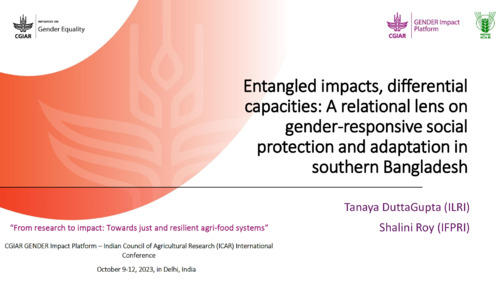Entangled impacts, differential capacities: A relational lens on gender-responsive social protection and adaptation in southern Bangladesh
Abstract
The combined effects of climate change, COVID-19 and rising prices shape vulnerabilities of rural communities, differentiated by gender, livelihood, asset ownership (including land and livestock), and type of social protection received. Do gender-responsive socialprotection and complementary programs targeting rural women help strengthen capacities to cope with and adapt to overlapping shocks and stresses? And do they simultaneously reinforce vulnerabilities and reproduce inequalities, as unintended consequences? Based on multi-sited fieldwork conducted in villages of Khulna, Bagerhat and Patuakhali districts of southern Bangladesh in 2022, this study employs a relational approach to focus on gender relations within households and broader power dynamics at community level. Data was collected through focus group discussions and semi-structured interviews with households where women were direct beneficiaries of either the Transfer Modality Research Initiative or the Vulnerable Group Development Program. With qualitative analysis guided by iterative deductive and inductive coding approaches, key findings indicate: (a) impacts of sudden-onset cyclonic events and the slower, gradual effects of salinization are gendered, experienced as water insecurity, paradoxical for a context with abundance of water, and (b) while cash, food and training components from past programs help households cope with future shocks and provide shortterm support, there is a risk that efforts to sustain their livelihoods may result in enhanced and uneven labor and debt burdens, perpetuating socially differentiated vicious cycles. Critical evaluation of such synergies and trade-offs are necessary for leveraging social protection for pathways to inclusive and transformative resilience.

